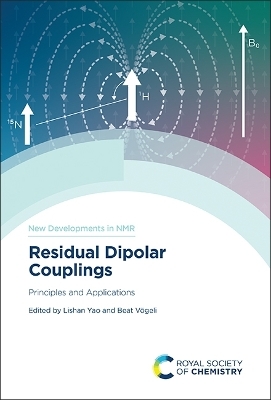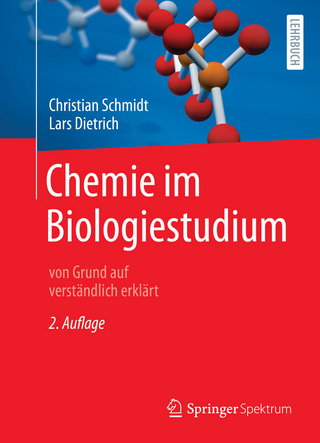
Residual Dipolar Couplings
Royal Society of Chemistry (Verlag)
978-1-83916-429-3 (ISBN)
Residual dipolar couplings (RDCs) are NMR measurements widely used to determine structural and dynamic information in small molecules and large macromolecules. This book provides a broad view of RDCs, from basic principles to advanced applications in organic molecules and biomolecules. Exploring the newest developments in RDC measurement and analysis through authoritative accounts written by leaders in the field, this book provides a comprehensive overview on the fundamentals, analysis and applications in one place for the first time.
The versatility and accuracy of RDCs have found a large range of applications in NMR, and their measurement and analysis are major research areas. Readers, be they experts or students, will receive a strong understanding of the fundamentals of RDCs and their applications to their research projects.
Professor Lishan Yao is an expert in protein solution NMR and molecular dynamics simulation. He has developed several NMR methods combined with MD simulations in studying protein noncovalent interactions (electrostatics, hydrogen bonds, van der Waals, and etc.). He has also developed residual dipolar couplings (RDCs) methods to determine protein structure and conformational dynamics. His research interests focus on studying protein conformational properties and weak interactions, and their impact on protein function. Beat Vögeli is an expert in nuclear magnetic resonance (NMR) spectroscopy of biomacromolecules. He develops methodology, including the use of residual dipolar couplings (RDCs), for the elucidation of conformation and communication networks within and between proteins and nucleic acids. He received his Ph.D. degree at the Swiss Federal Institute of Technology (ETH) Zürich, pursued research at the National Institutes of Health in Bethesda, and is currently an associate professor at the University of Colorado at Denver - Anschutz Medical School.
Introduction to Residual Dipolar Coupling;Theoretical Aspects of Residual Dipolar Couplings;External Media for Inducing Weak Alignment in Biomacromolecules;Generating Independent RDCs Using Paramagnetic Tags;Prediction of Weak Alignment from Molecule Structure;NMR Experiments for Measuring RDCs in Biomolecules;Study of Biomolecular Structure and Dynamics with Xplor-NIH;RDC for Membrane Proteins;Consistent Protein Structure Determination Using Sparse NMR Data;RNA Conformational Ensembles from NMR Residual Dipolar Couplings;Structure Determination of Organic Molecules Using RDCs (and RCSAs);Using RDCs and PCSs to Study Structure, Dynamics, and Interactions of Carbohydrates;Anisotropic NMR Methods: Orthogonal Verification of Novel and Complex Natural Product Structures
| Erscheinungsdatum | 08.02.2024 |
|---|---|
| Reihe/Serie | New Developments in NMR ; Volume 31 |
| Verlagsort | Cambridge |
| Sprache | englisch |
| Maße | 156 x 234 mm |
| Gewicht | 765 g |
| Themenwelt | Naturwissenschaften ► Biologie ► Biochemie |
| Naturwissenschaften ► Chemie ► Analytische Chemie | |
| Naturwissenschaften ► Physik / Astronomie ► Angewandte Physik | |
| ISBN-10 | 1-83916-429-8 / 1839164298 |
| ISBN-13 | 978-1-83916-429-3 / 9781839164293 |
| Zustand | Neuware |
| Informationen gemäß Produktsicherheitsverordnung (GPSR) | |
| Haben Sie eine Frage zum Produkt? |
aus dem Bereich


